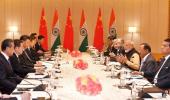The trio introduced a new approach to obtaining reliable answers about the best ways to fight global poverty

Indian-American Abhijit Banerjee, his wife Esther Duflo and another economist Michael Kremer jointly won the 2019 Nobel Economics Prize on Monday "for their experimental approach to alleviating global poverty."
Banerjee and French-American Duflo both work at the prestigious Massachusetts Institute of Technology while Kremer is at Harvard University.
Duflo, the 46-year-old former advisor to ex-United States president Barack Obama, is the second woman and the youngest ever to win the economics prize.
The prize includes 9 million-kronor (Rs 6.5 crore) cash, a gold medal and a diploma. The winners will equally share the prize money.
"The research conducted by this year's Laureates has considerably improved our ability to fight global poverty. In just two decades, their new experiment-based approach has transformed development economics, which is now a flourishing field of research," the Royal Swedish Academy of Sciences said.
They have introduced a new approach to obtaining reliable answers about the best ways to fight global poverty, it added.
Their "research findings -- and those of the researchers following in their footsteps - have dramatically improved our ability to fight poverty in practice," it said.
As a direct result of one of their studies, more than five million Indian children have benefitted from effective programmes of remedial tutoring in schools. Another example is the heavy subsidies for preventive healthcare that have been introduced in many countries, it added.
Duflo said that receiving the prize was "incredibly humbling".
"Showing that it is possible for a woman to succeed and be recognised for success I hope is going to inspire many, many other women to continue working and many other men to give them the respect they deserve," Duflo told a press conference over phone soon after the announcement.
Banerjee, 58, was educated at the University of Calcutta, Jawaharlal Nehru University and Harvard University, where he received his Ph.D in 1988. He is currently the Ford Foundation International Professor of Economics at the Massachusetts Institute of Technology, according to his profile on the MIT website.
In Kolkata, his mother Nirmala Banerjee said it was a proud moment for her and she is very happy for his achievements. She said she is also happy as one of the joint winners of the prestigious award is her daughter-in-law Esther Duflo.
"I am very happy and proud of his achievements," said Nirmala, a former professor of economics at the Centre for Studies in Social Sciences. Her husband Dipak Banerjee is also a professor and the head of the department of Economics at then Presidency College (now University).
"He did great work in understanding poverty and how the poor survived. At times we used to discuss various topics and issues on economics. He has also spoken on economic issues our country is facing presently," Nirmala said.
In 2003, Banerjee founded the Abdul Latif Jameel Poverty Action Lab, along with Duflo and Sendhil Mullainathan, and he remains one of the lab's directors. He also served on the UN Secretary-General's High-level Panel of Eminent Persons on the Post-2015 Development Agenda.
Duflo, born in 1972, is the Abdul Latif Jameel Professor of Poverty Alleviation and Development Economics in the Department of Economics at the Massachusetts Institute of Technology and a co-founder and co-director of the Abdul Latif Jameel Poverty Action Lab.
Banerjee supervised Duflo's PhD with Joshua Angrist in 1990. The duo got married in 2015 and their co-authored book 'Good Economics in Hard Times' will hits the stands this week.
With Banerjee, Duflo wrote Poor Economics: A Radical Rethinking of the Way to Fight Global Poverty, which won the Financial Times and Goldman Sachs Business Book of the Year Award in 2011 and has been translated into more than 17 languages.
She has worked on health, education, financial inclusion, environment and governance. Her first degrees were in history and economics from Ecole Normale Superieure, Paris. She subsequently received a PhD in Economics from MIT in 1999.
Duflo has received numerous academic honours and prizes including the Princess of Asturias Award for Social Sciences (2015), the A.SK Social Science Award (2015), Infosys Prize (2014), the David N. Kershaw Award (2011), a John Bates Clark Medal (2010), and a MacArthur “Genius Grant” Fellowship (2009).
She is the Editor of the American Economic Review, a member of the National Academy of Sciences and a Corresponding Fellow of the British Academy.
Kremer, 54, is a development economist, who is currently the Gates Professor of Developing Societies at Harvard University.
Congratulating Banerjee and his wife Duflo, the MIT said that their work has dramatically improved global ability to fight poverty in practice, including in India.
JNU vice-chancellor M Jagadesh Kumar also expressed pride at Banerjee's achievement.
"Prof Abhijit Vinayak Banerjee, a JNU alumnus (MA in Economics, 1983) wins Nobel Prize (together with two fellow economists) for contributing towards alleviating global poverty. JNU is proud of his achievement. Our alumni are torch bearers of JNU. We are proud of them," he tweeted.











 © 2025
© 2025